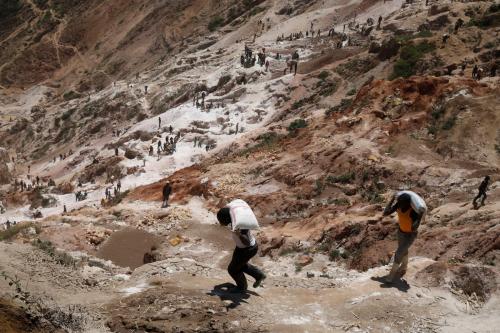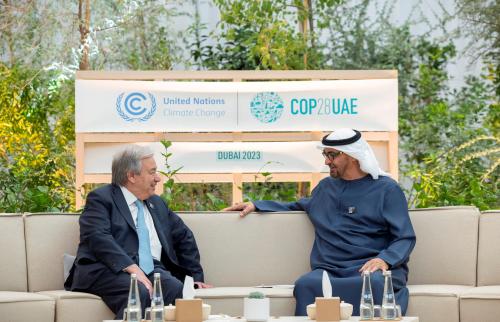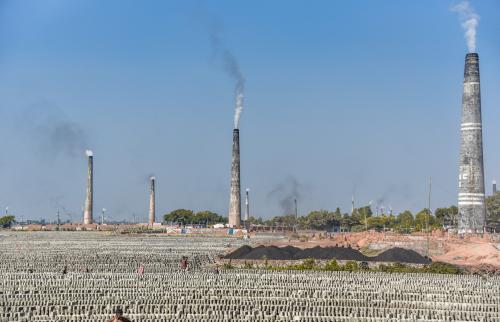What kind of role should Australia play in the world? One way to answer this question is to consider two seemingly unrelated issues, climate change and the war in Afghanistan.
There are a thousand differences between these topics. But consider their similarities. Both are diabolically difficult global problems. The complexities of climate change and Afghanistan are enough to make anyone’s eyes glaze over.
In both cases, the stakes are extremely high. The consensus among climate scientists is that climate change is already having severe effects and if left unchecked would be catastrophic for life on Earth. In Australia, it would mean more drought, more deaths from bushfires and infectious diseases, worse heatwaves, rising sea levels, falling agricultural production and the loss of the Great Barrier Reef.
The consequences of failure in Afghanistan are not as serious, but they are bracing. We recall the role that country played in the recent past as a Petri dish for global and South-East Asian terrorism. We also need to consider the consequences a defeat in Afghanistan would have on the stability of a region of enormous strategic importance, on the mindset of leaders and insurgents in Pakistan, and on the coherence of the West and the international position of our ally the United States.
The international community demonstrates striking unanimity on the importance of these issues. World leaders speak with one voice on the problem of climate change (although not on its solution). Unlike the Iraq war, the invasion of Afghanistan was approved by the United Nations Security Council and legitimised by countless declarations from national governments.
The cost of tackling both these issues is also intimidating. Addressing climate change involves restructuring the global economy. The United States, Britain, Canada, Australia and other countries have paid a steep price in blood and treasure for their involvement in Afghanistan.
In both cases, Australia is able to make a contribution that is meaningful but ultimately modest. We can’t stop global warming alone and neither can we win the war in Afghanistan. Australia is one of the highest per capita carbon emitters in the world but overall we produce less than 2 per cent of global emissions. Similarly, Australia contributes less than 2 per cent of troops in the International Security Assistance Force in Afghanistan; even if we were to expand our deployment, we could never provide more than a small fraction of the forces needed there.
Each issue, then, raises the same question: how great a contribution should Australia make to solving important problems where that contribution involves a sacrifice? Should we lead or free-ride? This is not only a philosophical question: it also provides a practical guide to how we should comport ourselves in the world.
Like the Rudd Government, I take the view that both of these are good fights – and I’m in favour of fighting both of them. But in the Australian debate, inconsistency is more the rule.
Some on the left want us to take radical steps on emissions trading, even if that involves significant short-term cost to the Australian economy.
But they also argue for a retreat from Afghanistan, notwithstanding the legality and legitimacy of our efforts there. In other words, we should lead on climate change and free-ride on Afghanistan.
On the other hand, many conservatives are rock-solid on the proposition that Australia should help our allies in Afghanistan (even though we cannot make a decisive contribution) but keen to pass the buck on climate change (on the ground that we cannot make a decisive contribution). They want us to lead on Afghanistan and free-ride on climate change.
Australian conservatives say we should not proceed with the Government’s carbon pollution reduction scheme until we see what happens in the forthcoming negotiations in the US Senate in Washington and at the UN climate talks in Copenhagen.
In making this argument, our diehards are not alone. It is the easiest thing in the world to dodge responsibility on the ground that someone else hasn’t yet taken it. In the United States, for example, many in the Congress say that America should wait to see what India and China do.
Climate change and the Afghanistan war are alike in one final way: in neither case can we be sure of success. But we also know that a sure route to failure is if countries such as Australia stand down rather than stand up.
We should do what we can to generate momentum in the lead-up to Copenhagen by passing the carbon scheme. We should do what we can after the Afghanistan elections to show Afghans that we are there for the long term. And our politicians and commentators should bring a little consistency to their thinking about Australia’s role in the world.



Commentary
Op-edGlobal Warming and War Both Require Sacrifice
September 8, 2009